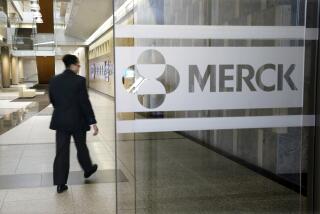Investors Rewarding Merck for Foresight, Decisiveness
- Share via
What makes a good company? Intangibles, such as boldness, competence, leadership.
For example, the chairman of Merck & Co., the world’s largest drug company, recently told Wall Street analysts that it would be tougher for Merck to earn its traditional high profits as medicine changed from doctor-patient relationships to managed care and regulated prices.
Chairman P. Roy Vagelos, a physician, spoke bluntly of the challenge at a time when Merck stock was at about $138 a share.
Now, a month later, Merck is selling closer to $150 and is recommended by analysts who see management coping with the new circumstances--keeping down price increases, working to sell directly to health maintenance organizations in the United States and governments in Europe.
It helps that Merck’s technological position is sound. Patents on its many important drugs don’t begin expiring until 1997. And its stock is buoyed by enthusiasm for new products to combat debilities of aging--prostate trouble in men, osteoporosis or brittle bone disease that mainly hits women.
But the real reason the stock remains high is leadership. The market has confidence because the company is acting decisively and pursuing intelligent policies.
And so it has given Merck, a Rahway, N.J., company that this year will earn about $2 billion on more than $8 billion in sales, a 60% rise in stock price in the past 12 months. More to the point, Merck stock has risen tenfold since 1982, as profits in some years have grown more than 20%.
Merck, in short, helps define a good company, and that’s something you should be interested in as more Americans are called upon to make investment decisions about their retirement funds.
Pension plans in which employees make the choices--401k and other defined contribution plans--total $900 billion, or one-third of all pension assets, according to Pensions and Investments magazine.
But employees’ investment decisions so far have been overly conservative--70% in guaranteed interest contracts (GICs), which pledge a rate keyed to current Treasury bonds. Right now GICs are offering about 7%. That may sound fine for a savings account but not a retirement plan, which should accumulate capital gains or high compound interest.
Today’s GICs don’t measure up, paying in effect 4% after inflation. By contrast, growth stock mutual funds offer more risk but can return 25% a year, and more.
Therefore, it makes sense for people in their 30s to invest in equities, says Peter Smale, of Fidelity Investments, switching to GICs and government bonds--with less risk of loss of principal--in their late 50s.
The success of mutual funds reflects the fact that stock prices since the 1920s have risen 10% a year on average--although they went flat in the 1930s. Also mutual funds can grow faster than average because two or three big winners--such as Merck in 1991--make all the difference in a portfolio.
That’s why successful investors seek out leadership companies and stay with them for decades--although not necessarily forever. IBM, for example, seems to be following, not leading, its rapidly changing industry, and thus its stock has fallen.
With legendary foresight, the mutual fund pioneer Thomas Rowe Price sold his holdings of U.S. automobile companies in the early 1960s, years before the competitive lag that has cost them world leadership became evident.
Now Merck’s mettle is being tested. With other pharmaceutical companies raising prices 10% a year, regulatory legislation is threatened in the U.S. Senate. With companies and governments crying out against rising medical costs, purchasing of pharmaceuticals is being taken over by HMOs and insurance companies.
Merck’s response has been quick and politically savvy. Vagelos has pledged that Merck’s prices will rise no faster than consumer goods in general. Adjusting to new institutional customers, Merck already has supply and service agreements “covering 70% of the hospital beds in the United States,” Vagelos told analysts.
To cut costs, Merck’s sales force of 2,700 will be reduced by attrition. Mass layoffs can be avoided because mass hiring was never encouraged; in 10 years Merck’s work force has grown 14% while sales have grown 200%.
Most important, Merck is not afraid to bank on the future. Always a heavy investor in research, the company is spending $1 billion or 12% of revenues this year, more than any pharmaceutical company here or abroad.
Vagelos, 62, knows how effective research can be. In 1975 he came to Merck from a post at Washington University in St. Louis with an idea about studying cholesterol. A decade later he became chief executive, and the anti-cholesterol drugs that came out of research are producing big sales and earnings for Merck today.
“It’s not simply research,” says analyst Jay Silverman of Nomura Securities. “They have a knack of focusing science and marketing on the right products.”
Now Merck’s research focus is moving to aging, an obvious field as populations grow older in Europe, Japan and the United States.
Still, there’s no guarantee that even $1 billion a year will produce breakthroughs. The only thing a good company really has going for it are intangibles--dedication, perseverance, leadership.
More to Read
Inside the business of entertainment
The Wide Shot brings you news, analysis and insights on everything from streaming wars to production — and what it all means for the future.
You may occasionally receive promotional content from the Los Angeles Times.










